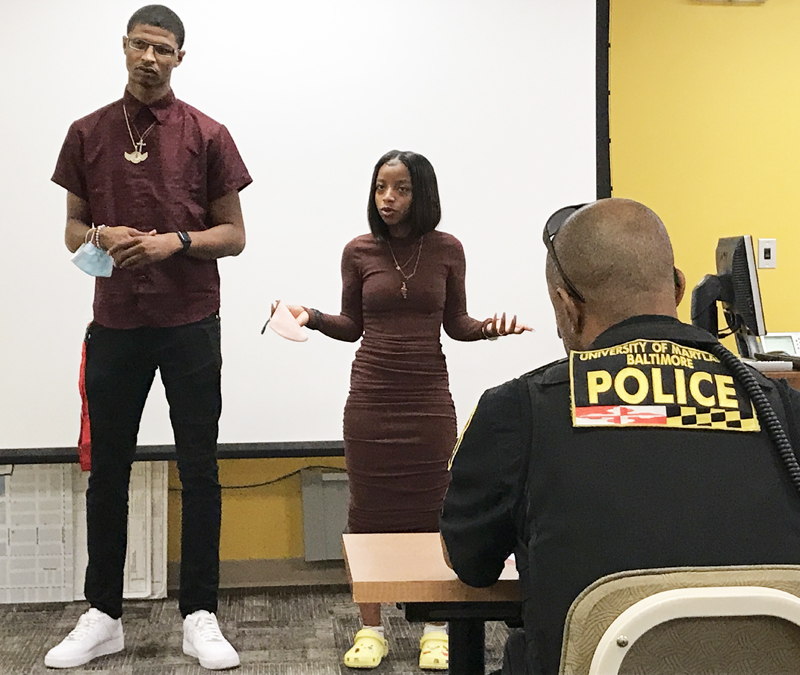February 2022
"I've lost many friends to gun violence, and seeing poverty and drugs in my community, honestly, has been really traumatizing for me." Those are the words of Young Elder, a youth ambassador in the Healing Youth Alliance, led by University of Maryland School of Social Work (UMSSW) Clinical Associate Professor Kyla Liggett-Creel, PhD, MSW.
Formed in 2020, the Healing Youth Alliance is a partnership between UMSSW, the Black Mental Health Alliance, and Heartsmiles that’s working to address the effects of untreated trauma and the stigma around receiving mental health treatment.

Healing Youth Ambassadors Shelah Johnson and Jima Chester speak to UMB Police in July 2021.
HYA does that by teaching youth about mental health in the African American community, finding ways to de-stigmatize mental health issues, and giving them tools to cope with trauma. It’s giving voice to the experiences of Baltimore teens to help heal the trauma they and really everyone in their communities face. And they face a wide array of trauma, from exposure to violence and drug addiction, mental health issues, sickness and the loss of family members, incarceration, poverty, and of course, systemic racism.
It’s not enough to think of trauma as the effect on one person of one event or even a series of events. The community is traumatized, so everyone is traumatized. The approach on which Dr. K — as she’s affectionately known — is leading the way is called Healing-Centered Engagement. The term was popularized by Shawn Ginwright, PhD, of San Francisco State University in 2018. In his article, “The Future of Healing: Shifting From Trauma Informed Care to Healing Centered Engagement,” Ginwright asserted that trauma-informed care runs the risk of focusing too much on pathology and not enough on achieving well-being.
Trauma-informed care or engagement considers the pervasive nature of trauma in a community and how that affects the individual. The focus is on actions that promote recovery and avoid actions that might unintentionally re-traumatize, potentially starting the cycle all over again.
A healing-centered approach looks at trauma as a collective experience, so the focus is on collective healing. It’s important to consider culture, spirituality, and community actions. As Liggett-Creel points out, it’s very similar to a traditional South African concept called Ubuntu, sometimes translated as “I am because we are.” Ubuntu stresses the interconnectness of a community, and the need not only to heal just the person perceived to be traumatized, but to collaborate to heal the entire community. In short, focusing on the healing we want and not just suppressing the symptoms we don’t want.
That approach is now being applied in a very thoughtful way by University of Maryland, Baltimore (UMB) police to help them understand and engage with the community, and to help the community — particularly young people — understand and engage with them. As you might imagine, this program is called Healing-Centered Policing.
It all started with visits by Healing Youth Alliance ambassadors to the UMB Police Department in July 2021. The young people talked about their impressions of and experiences with police, which were not positive, and how their treatment made them feel. So, it was a little surprising to everyone involved when at subsequent visits and on ride-alongs something happened.
In January, one of those first speakers, Jima Chester, presented UMB Police with a painting she made as a gesture of appreciation. “I painted this for the police department out of appreciation for all their genuine efforts and success with caring, bonding, and teaching youth,” she explained.
“They probably don’t even know it but being around them and being able to see some of the things they do, and experience created transparency and vulnerability between me and the officers. The painting was a thank you for them helping me understand their job and for them understanding me and for treating me as family.”
Liggett-Creel and UMB Police Department Chief Thomas Leone, MSL, joined UMB President Bruce E. Jarrell, MD, FACS, on Virtual Face to Face with President Bruce Jarrell on Feb. 10 to explain how police and city youth, with the help of UMSSW social workers are taking the next step. Their first-in-the-nation partnership is changing hearts and minds and helping to deliver needed services to vulnerable residents.
Watch the entire discussion at the link at the top of this page.
Search UMB News
Sign up for UMB Alerts.



